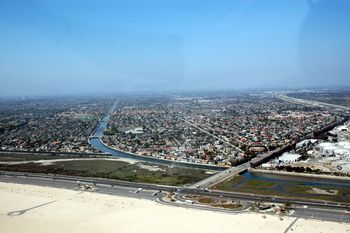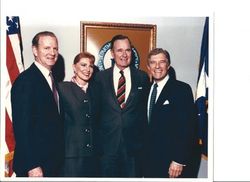
The suburbanization of America, within which the baby boom grew to adulthood, was both a protective cocoon and a welcoming society. Technology was an unalloyed good, adding to incomes without demanding too much of the recipients. Much of that income was funneled, through government, into “entitlements” – benefits to which people felt entitled. If you got drafted your health care would be taken care of. The suburbs had good public schools, even good public universities.
There was abundant market friction into which ex-jocks and cheerleaders could slide into golf course lives as insurance salesmen, real estate developers and travel agents. There was abundant land, and state government developed it with free roads and sewer hook-ups, so the boomers could “drive until they qualified.” Some stayed in the suburbs to run things like my dad’s TV repair shop, and later his lock shop. Some became educators like the people in my wife’s family, or my own brother. Others married lucky, like me.

What happened, starting in 2000, is that technology seemed to turn from friend to foe. First it came for the office workers, the middle managers who had shuffled papers, gone to meetings, and taken the lazy lunches on corporate expense accounts. When these boomers fell off the ladder, for the first time there was no new career waiting for which they were qualified to cushion the fall. The ride of our lifetime simply ended.
It was one thing when technology was taking away dull, dead-end jobs in manufacturing or distribution. It was quite another when it was eliminating good-paying office jobs in business processes, customer relations or direct sales and saying, “We have an app for that.”
What of our kids? Suddenly they faced direct competition for good college slots in science, technology, engineering and math from the best-and-brightest of the entire world. The parents of these Asian kids could pay full freight, the kids worked like stink and got the grades, and then they got the best jobs. We created enormous software factories for Microsoft and Google, then our kids turned around and found themselves working for Indians or Chinese immigrants.

Then came Obama, and it wasn’t just that the assumptions of the past were proving to be false, with new assumptions replacing them, but that they seemed to be coming from a foreign direction. Hawaii, with its racial diversity and tolerance is for most white Americans as foreign as Kenya, and this man wasn’t even a conventional black politician, someone they could pigeonhole or dismiss. He looked a little like Jesse Jackson but talked more like Adlai Stevenson. It was infuriating, and when Sarah Palin came along, the governor of a state that literally paid people to live there, saying that it wasn’t white America’s fault, that it was Obama’s fault, and those other people with strange names filling the universities, white America swooned.
A generation’s assumptions had made the knees jerk right on command, and the seat of power was control over resources, enforced through the blood and might of America’s military. Now those assumptions, too, were being questioned.

Perhaps no figure represents this disconnect better than Marc Benioff. Salesforce.com has destroyed more white-collar jobs held by more white baby boomers than any other company this decade, enabling the creation of cloud-based apps that live on phones and eliminate market friction in all its forms – middle managers, insurance brokers, real estate agents, stock brokers, and salesmen of all kinds. This has made Benioff a billionaire, but it has also made him this decade’s chief scold, bullying state legislatures that thought a little hate was all their constituencies needed to keep their minds off what was happening to them.

TechLand, and the elites in Hollywood, Washington and New York now beholden to it, does not understand the fear and hatred all this engenders. We, and they, don’t understand that when you take away a man’s job, his dignity, and that of his children, telling them all that their only hope is to learn skills they can’t possibly learn (but that a bunch of foreigners have already mastered) it’s going to create a little resentment.
It’s enough to make Trumpistanis stop believing in democracy. And that is the great threat of our time. Everything white baby boomers were raised to believe in has proven to be wrong. In its place is what looks like a foreign thesis, technology driving change ever-faster, consuming sales jobs today and driving jobs tomorrow, promising a brave new world that we have no hope of understanding.
It’s ironic that the people most under the grip of Trumpistan are those most likely to be on the government dole. Social Security recipients, VA recipients, Medicare recipients, people on disability, folks who’ve learned how to work the angles and get along on someone else’s dime, these are the people most attracted to Trump. They once called themselves conservative, but that was just a label meant to piss off TechLand. When true conservatives started pointing to their privileges and promised to take them away, they rushed to a demagogue who promised to blame everyone but them. They raced to the TV star, to the guy who spoke in contradictory sound bites, to the kind of scoundrel every nation seeks when it’s hurting, who promises to make everything all right but won’t reveal how the trick is done. The despot.

But even after he loses, there will remain damage to be dealt with. The Greatest Generation is gone, the Baby Boomers are aging out, the kids are lost without us, and it will be up to TechLand to pick up the pieces.
Techland, right now, doesn’t even know what the pieces are, let alone have a clue as to how they fit to make a new society.










